AM801001 Sociology Report: Interpersonal Skills, CSR and Maori Values
VerifiedAdded on 2022/10/19
|18
|4983
|162
Report
AI Summary
This report, submitted for the AM801001 Capabilities for Managers course at Auckland International Campus, delves into the crucial role of interpersonal skills in effective management. It examines communication, conflict resolution, and negotiation skills, essential for navigating workplace dynamics and addressing corporate social responsibility (CSR) issues. The report analyzes the characters of exploration testing opportunities in New Zealand, focusing on the interaction between Koper Resources Company (KRC), Maori Iwi, and government agencies, highlighting the importance of CSR disclosure and solutions. Furthermore, it explores team performance management, emphasizing the framing of team participation guidelines and the integration of Maori values like Whanaungatanga and Manaakitanga to foster a collaborative and culturally sensitive work environment. The report concludes with a comprehensive overview of the discussed concepts, providing valuable insights into the practical application of management skills in complex organizational settings.
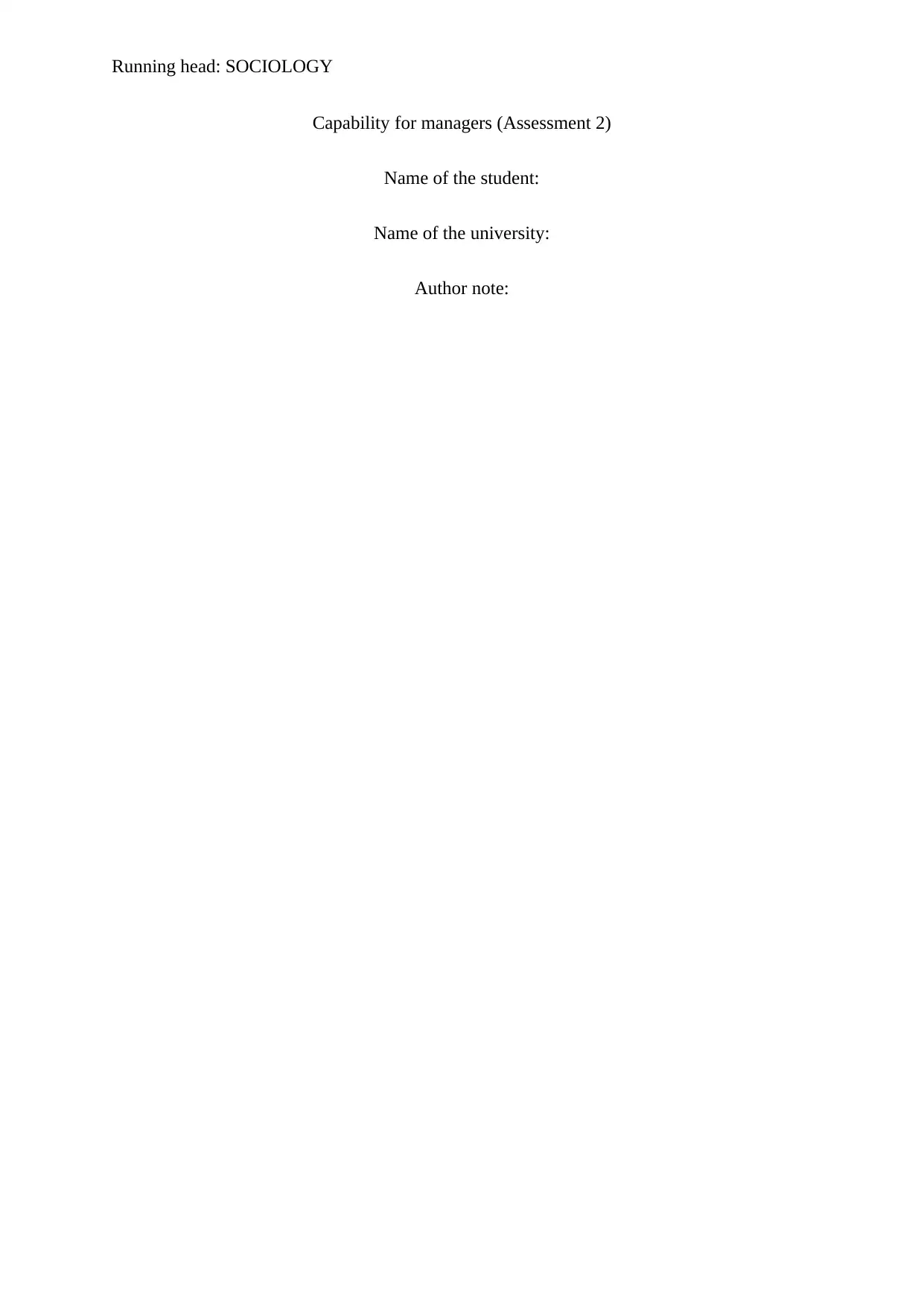
Running head: SOCIOLOGY
Capability for managers (Assessment 2)
Name of the student:
Name of the university:
Author note:
Capability for managers (Assessment 2)
Name of the student:
Name of the university:
Author note:
Paraphrase This Document
Need a fresh take? Get an instant paraphrase of this document with our AI Paraphraser
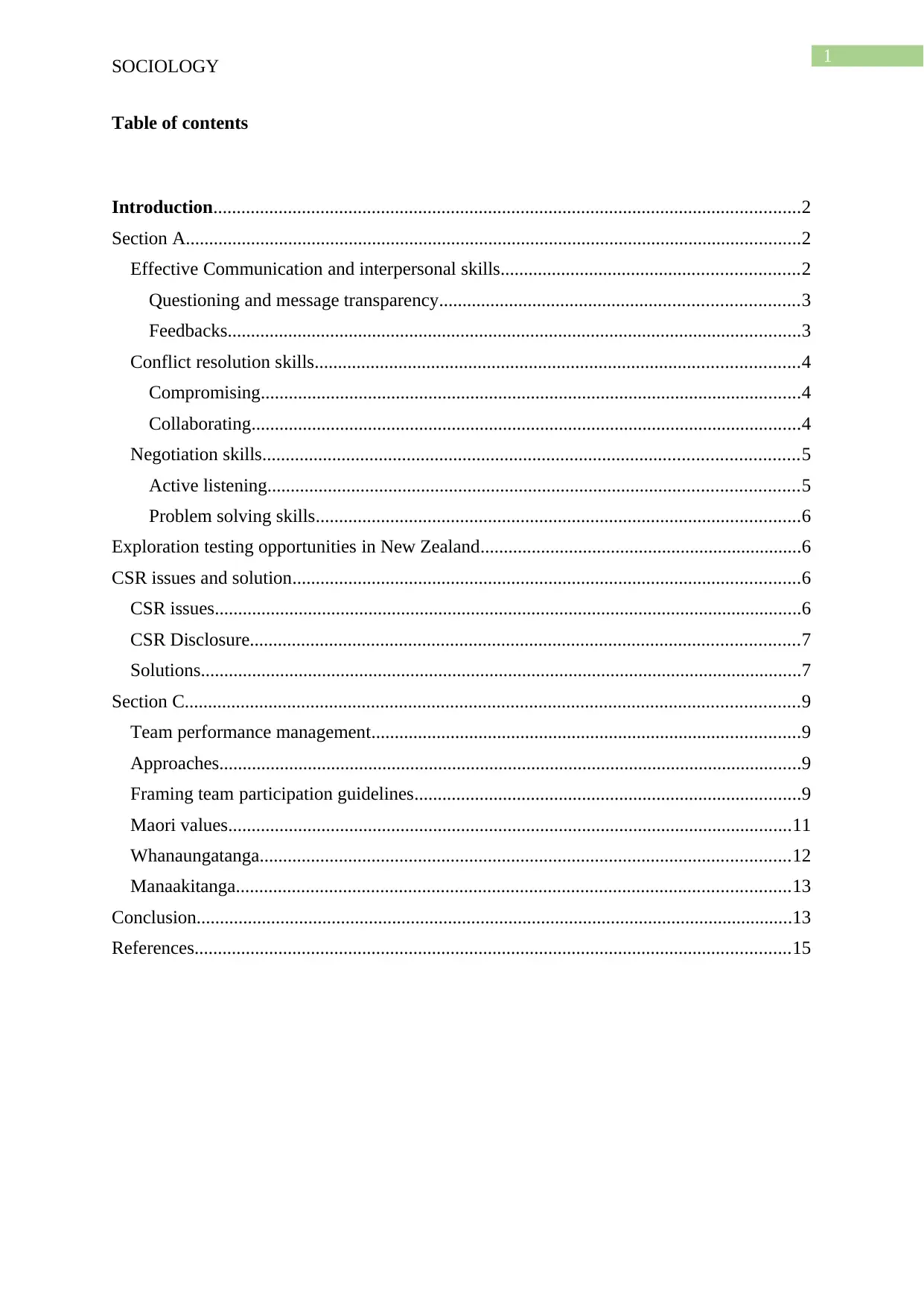
1
SOCIOLOGY
Table of contents
Introduction..............................................................................................................................2
Section A....................................................................................................................................2
Effective Communication and interpersonal skills................................................................2
Questioning and message transparency.............................................................................3
Feedbacks...........................................................................................................................3
Conflict resolution skills........................................................................................................4
Compromising....................................................................................................................4
Collaborating......................................................................................................................4
Negotiation skills...................................................................................................................5
Active listening..................................................................................................................5
Problem solving skills........................................................................................................6
Exploration testing opportunities in New Zealand.....................................................................6
CSR issues and solution.............................................................................................................6
CSR issues..............................................................................................................................6
CSR Disclosure......................................................................................................................7
Solutions.................................................................................................................................7
Section C....................................................................................................................................9
Team performance management............................................................................................9
Approaches.............................................................................................................................9
Framing team participation guidelines...................................................................................9
Maori values.........................................................................................................................11
Whanaungatanga..................................................................................................................12
Manaakitanga.......................................................................................................................13
Conclusion................................................................................................................................13
References................................................................................................................................15
SOCIOLOGY
Table of contents
Introduction..............................................................................................................................2
Section A....................................................................................................................................2
Effective Communication and interpersonal skills................................................................2
Questioning and message transparency.............................................................................3
Feedbacks...........................................................................................................................3
Conflict resolution skills........................................................................................................4
Compromising....................................................................................................................4
Collaborating......................................................................................................................4
Negotiation skills...................................................................................................................5
Active listening..................................................................................................................5
Problem solving skills........................................................................................................6
Exploration testing opportunities in New Zealand.....................................................................6
CSR issues and solution.............................................................................................................6
CSR issues..............................................................................................................................6
CSR Disclosure......................................................................................................................7
Solutions.................................................................................................................................7
Section C....................................................................................................................................9
Team performance management............................................................................................9
Approaches.............................................................................................................................9
Framing team participation guidelines...................................................................................9
Maori values.........................................................................................................................11
Whanaungatanga..................................................................................................................12
Manaakitanga.......................................................................................................................13
Conclusion................................................................................................................................13
References................................................................................................................................15
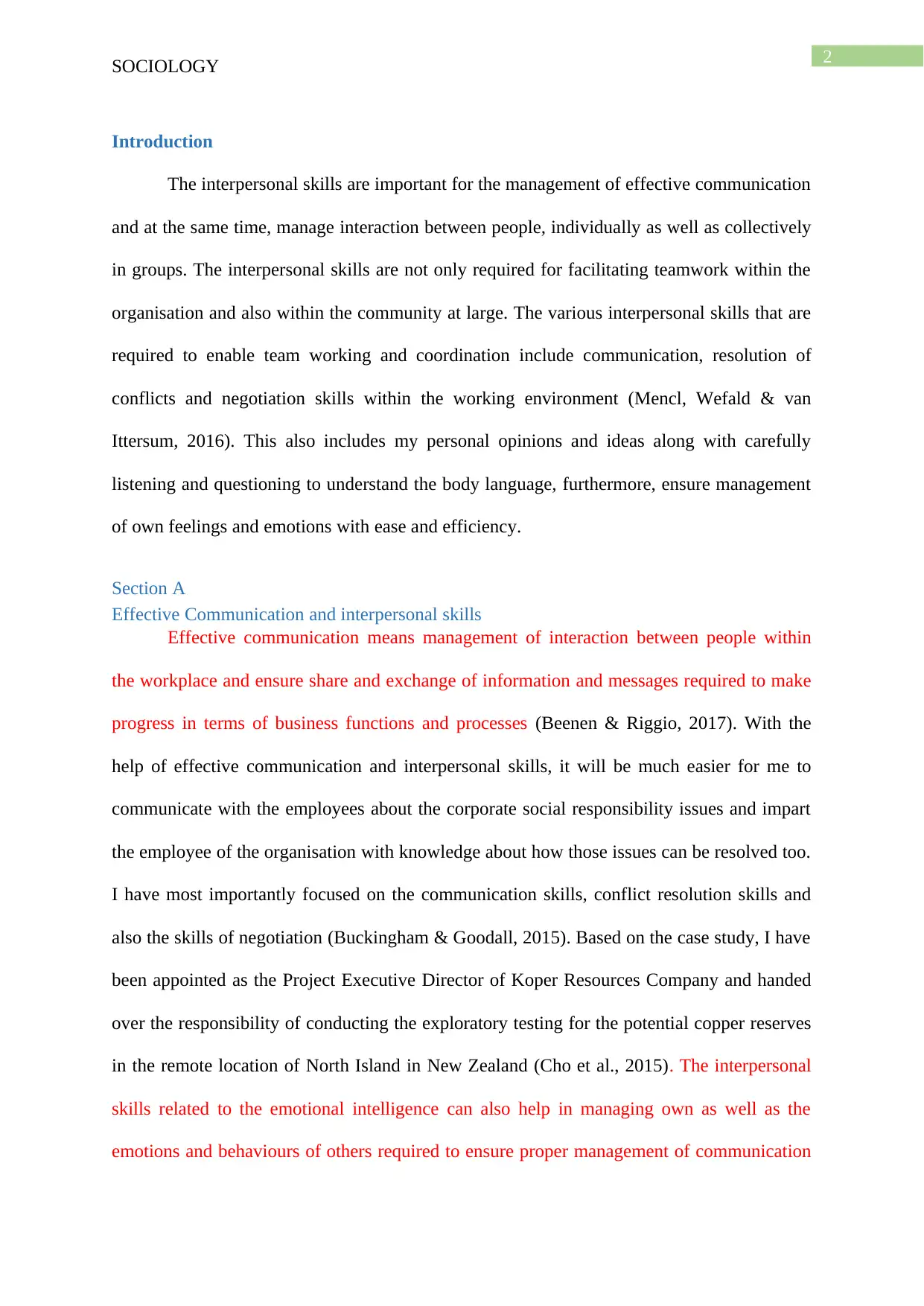
2
SOCIOLOGY
Introduction
The interpersonal skills are important for the management of effective communication
and at the same time, manage interaction between people, individually as well as collectively
in groups. The interpersonal skills are not only required for facilitating teamwork within the
organisation and also within the community at large. The various interpersonal skills that are
required to enable team working and coordination include communication, resolution of
conflicts and negotiation skills within the working environment (Mencl, Wefald & van
Ittersum, 2016). This also includes my personal opinions and ideas along with carefully
listening and questioning to understand the body language, furthermore, ensure management
of own feelings and emotions with ease and efficiency.
Section A
Effective Communication and interpersonal skills
Effective communication means management of interaction between people within
the workplace and ensure share and exchange of information and messages required to make
progress in terms of business functions and processes (Beenen & Riggio, 2017). With the
help of effective communication and interpersonal skills, it will be much easier for me to
communicate with the employees about the corporate social responsibility issues and impart
the employee of the organisation with knowledge about how those issues can be resolved too.
I have most importantly focused on the communication skills, conflict resolution skills and
also the skills of negotiation (Buckingham & Goodall, 2015). Based on the case study, I have
been appointed as the Project Executive Director of Koper Resources Company and handed
over the responsibility of conducting the exploratory testing for the potential copper reserves
in the remote location of North Island in New Zealand (Cho et al., 2015). The interpersonal
skills related to the emotional intelligence can also help in managing own as well as the
emotions and behaviours of others required to ensure proper management of communication
SOCIOLOGY
Introduction
The interpersonal skills are important for the management of effective communication
and at the same time, manage interaction between people, individually as well as collectively
in groups. The interpersonal skills are not only required for facilitating teamwork within the
organisation and also within the community at large. The various interpersonal skills that are
required to enable team working and coordination include communication, resolution of
conflicts and negotiation skills within the working environment (Mencl, Wefald & van
Ittersum, 2016). This also includes my personal opinions and ideas along with carefully
listening and questioning to understand the body language, furthermore, ensure management
of own feelings and emotions with ease and efficiency.
Section A
Effective Communication and interpersonal skills
Effective communication means management of interaction between people within
the workplace and ensure share and exchange of information and messages required to make
progress in terms of business functions and processes (Beenen & Riggio, 2017). With the
help of effective communication and interpersonal skills, it will be much easier for me to
communicate with the employees about the corporate social responsibility issues and impart
the employee of the organisation with knowledge about how those issues can be resolved too.
I have most importantly focused on the communication skills, conflict resolution skills and
also the skills of negotiation (Buckingham & Goodall, 2015). Based on the case study, I have
been appointed as the Project Executive Director of Koper Resources Company and handed
over the responsibility of conducting the exploratory testing for the potential copper reserves
in the remote location of North Island in New Zealand (Cho et al., 2015). The interpersonal
skills related to the emotional intelligence can also help in managing own as well as the
emotions and behaviours of others required to ensure proper management of communication
⊘ This is a preview!⊘
Do you want full access?
Subscribe today to unlock all pages.

Trusted by 1+ million students worldwide
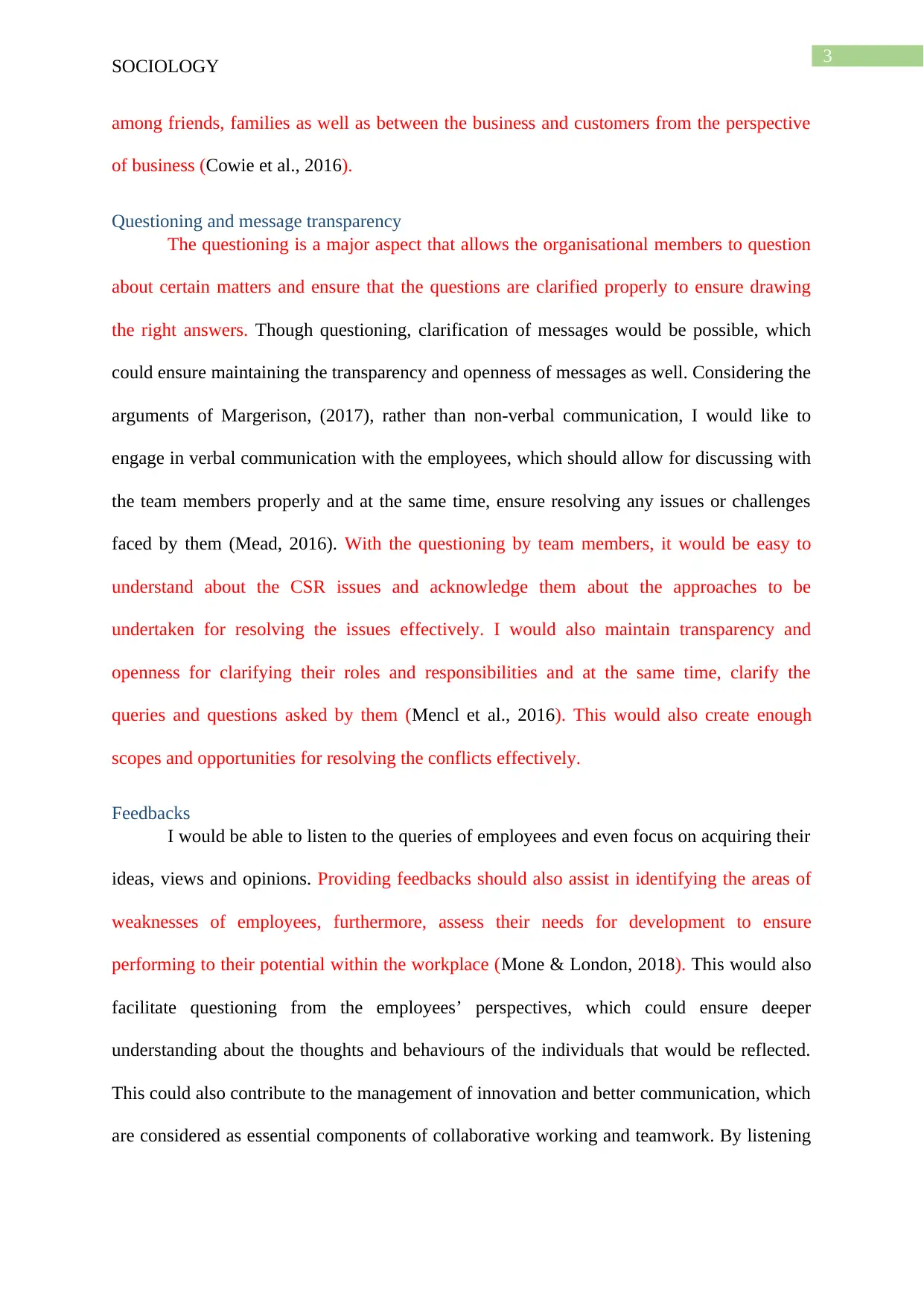
3
SOCIOLOGY
among friends, families as well as between the business and customers from the perspective
of business (Cowie et al., 2016).
Questioning and message transparency
The questioning is a major aspect that allows the organisational members to question
about certain matters and ensure that the questions are clarified properly to ensure drawing
the right answers. Though questioning, clarification of messages would be possible, which
could ensure maintaining the transparency and openness of messages as well. Considering the
arguments of Margerison, (2017), rather than non-verbal communication, I would like to
engage in verbal communication with the employees, which should allow for discussing with
the team members properly and at the same time, ensure resolving any issues or challenges
faced by them (Mead, 2016). With the questioning by team members, it would be easy to
understand about the CSR issues and acknowledge them about the approaches to be
undertaken for resolving the issues effectively. I would also maintain transparency and
openness for clarifying their roles and responsibilities and at the same time, clarify the
queries and questions asked by them (Mencl et al., 2016). This would also create enough
scopes and opportunities for resolving the conflicts effectively.
Feedbacks
I would be able to listen to the queries of employees and even focus on acquiring their
ideas, views and opinions. Providing feedbacks should also assist in identifying the areas of
weaknesses of employees, furthermore, assess their needs for development to ensure
performing to their potential within the workplace (Mone & London, 2018). This would also
facilitate questioning from the employees’ perspectives, which could ensure deeper
understanding about the thoughts and behaviours of the individuals that would be reflected.
This could also contribute to the management of innovation and better communication, which
are considered as essential components of collaborative working and teamwork. By listening
SOCIOLOGY
among friends, families as well as between the business and customers from the perspective
of business (Cowie et al., 2016).
Questioning and message transparency
The questioning is a major aspect that allows the organisational members to question
about certain matters and ensure that the questions are clarified properly to ensure drawing
the right answers. Though questioning, clarification of messages would be possible, which
could ensure maintaining the transparency and openness of messages as well. Considering the
arguments of Margerison, (2017), rather than non-verbal communication, I would like to
engage in verbal communication with the employees, which should allow for discussing with
the team members properly and at the same time, ensure resolving any issues or challenges
faced by them (Mead, 2016). With the questioning by team members, it would be easy to
understand about the CSR issues and acknowledge them about the approaches to be
undertaken for resolving the issues effectively. I would also maintain transparency and
openness for clarifying their roles and responsibilities and at the same time, clarify the
queries and questions asked by them (Mencl et al., 2016). This would also create enough
scopes and opportunities for resolving the conflicts effectively.
Feedbacks
I would be able to listen to the queries of employees and even focus on acquiring their
ideas, views and opinions. Providing feedbacks should also assist in identifying the areas of
weaknesses of employees, furthermore, assess their needs for development to ensure
performing to their potential within the workplace (Mone & London, 2018). This would also
facilitate questioning from the employees’ perspectives, which could ensure deeper
understanding about the thoughts and behaviours of the individuals that would be reflected.
This could also contribute to the management of innovation and better communication, which
are considered as essential components of collaborative working and teamwork. By listening
Paraphrase This Document
Need a fresh take? Get an instant paraphrase of this document with our AI Paraphraser
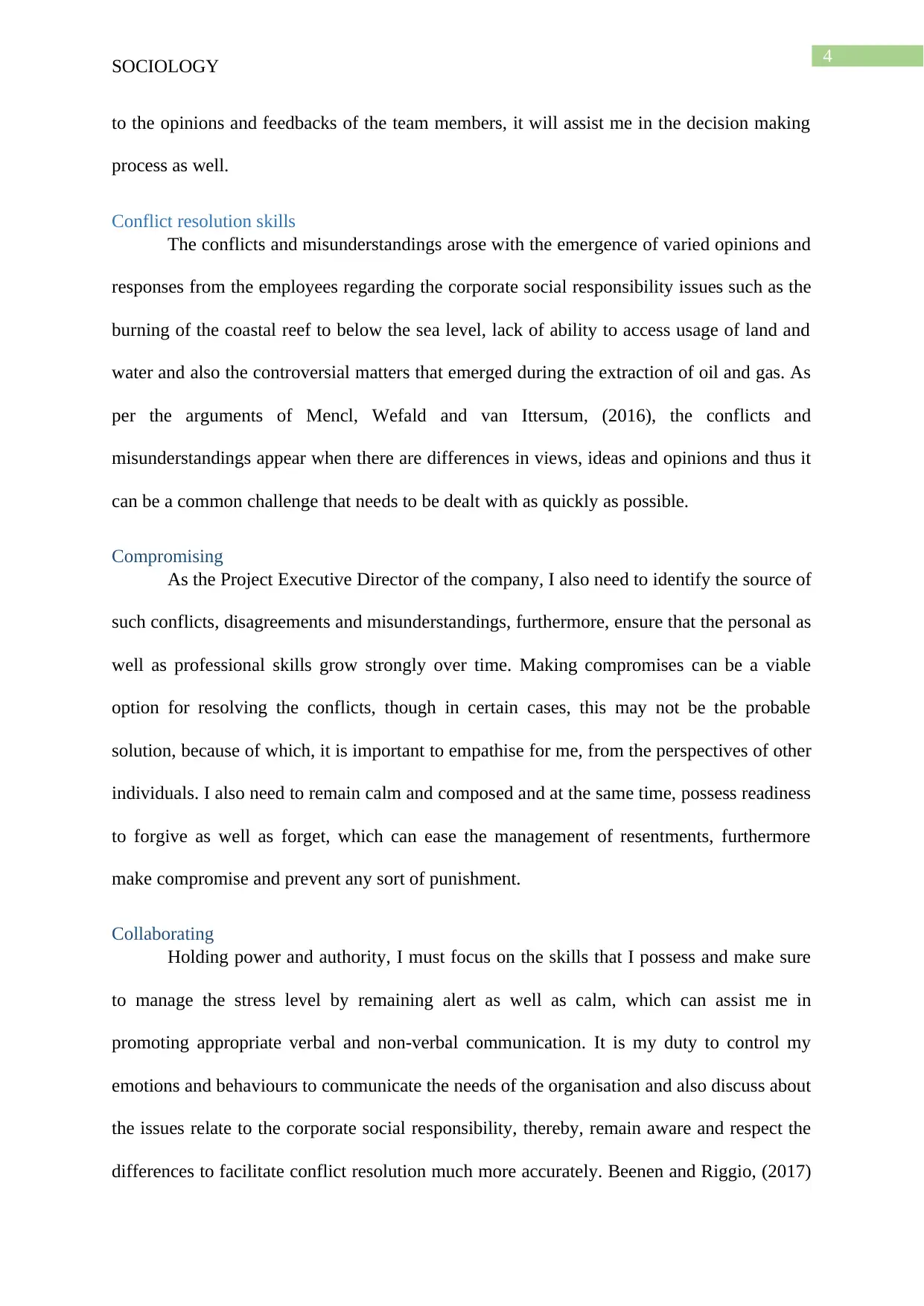
4
SOCIOLOGY
to the opinions and feedbacks of the team members, it will assist me in the decision making
process as well.
Conflict resolution skills
The conflicts and misunderstandings arose with the emergence of varied opinions and
responses from the employees regarding the corporate social responsibility issues such as the
burning of the coastal reef to below the sea level, lack of ability to access usage of land and
water and also the controversial matters that emerged during the extraction of oil and gas. As
per the arguments of Mencl, Wefald and van Ittersum, (2016), the conflicts and
misunderstandings appear when there are differences in views, ideas and opinions and thus it
can be a common challenge that needs to be dealt with as quickly as possible.
Compromising
As the Project Executive Director of the company, I also need to identify the source of
such conflicts, disagreements and misunderstandings, furthermore, ensure that the personal as
well as professional skills grow strongly over time. Making compromises can be a viable
option for resolving the conflicts, though in certain cases, this may not be the probable
solution, because of which, it is important to empathise for me, from the perspectives of other
individuals. I also need to remain calm and composed and at the same time, possess readiness
to forgive as well as forget, which can ease the management of resentments, furthermore
make compromise and prevent any sort of punishment.
Collaborating
Holding power and authority, I must focus on the skills that I possess and make sure
to manage the stress level by remaining alert as well as calm, which can assist me in
promoting appropriate verbal and non-verbal communication. It is my duty to control my
emotions and behaviours to communicate the needs of the organisation and also discuss about
the issues relate to the corporate social responsibility, thereby, remain aware and respect the
differences to facilitate conflict resolution much more accurately. Beenen and Riggio, (2017)
SOCIOLOGY
to the opinions and feedbacks of the team members, it will assist me in the decision making
process as well.
Conflict resolution skills
The conflicts and misunderstandings arose with the emergence of varied opinions and
responses from the employees regarding the corporate social responsibility issues such as the
burning of the coastal reef to below the sea level, lack of ability to access usage of land and
water and also the controversial matters that emerged during the extraction of oil and gas. As
per the arguments of Mencl, Wefald and van Ittersum, (2016), the conflicts and
misunderstandings appear when there are differences in views, ideas and opinions and thus it
can be a common challenge that needs to be dealt with as quickly as possible.
Compromising
As the Project Executive Director of the company, I also need to identify the source of
such conflicts, disagreements and misunderstandings, furthermore, ensure that the personal as
well as professional skills grow strongly over time. Making compromises can be a viable
option for resolving the conflicts, though in certain cases, this may not be the probable
solution, because of which, it is important to empathise for me, from the perspectives of other
individuals. I also need to remain calm and composed and at the same time, possess readiness
to forgive as well as forget, which can ease the management of resentments, furthermore
make compromise and prevent any sort of punishment.
Collaborating
Holding power and authority, I must focus on the skills that I possess and make sure
to manage the stress level by remaining alert as well as calm, which can assist me in
promoting appropriate verbal and non-verbal communication. It is my duty to control my
emotions and behaviours to communicate the needs of the organisation and also discuss about
the issues relate to the corporate social responsibility, thereby, remain aware and respect the
differences to facilitate conflict resolution much more accurately. Beenen and Riggio, (2017)
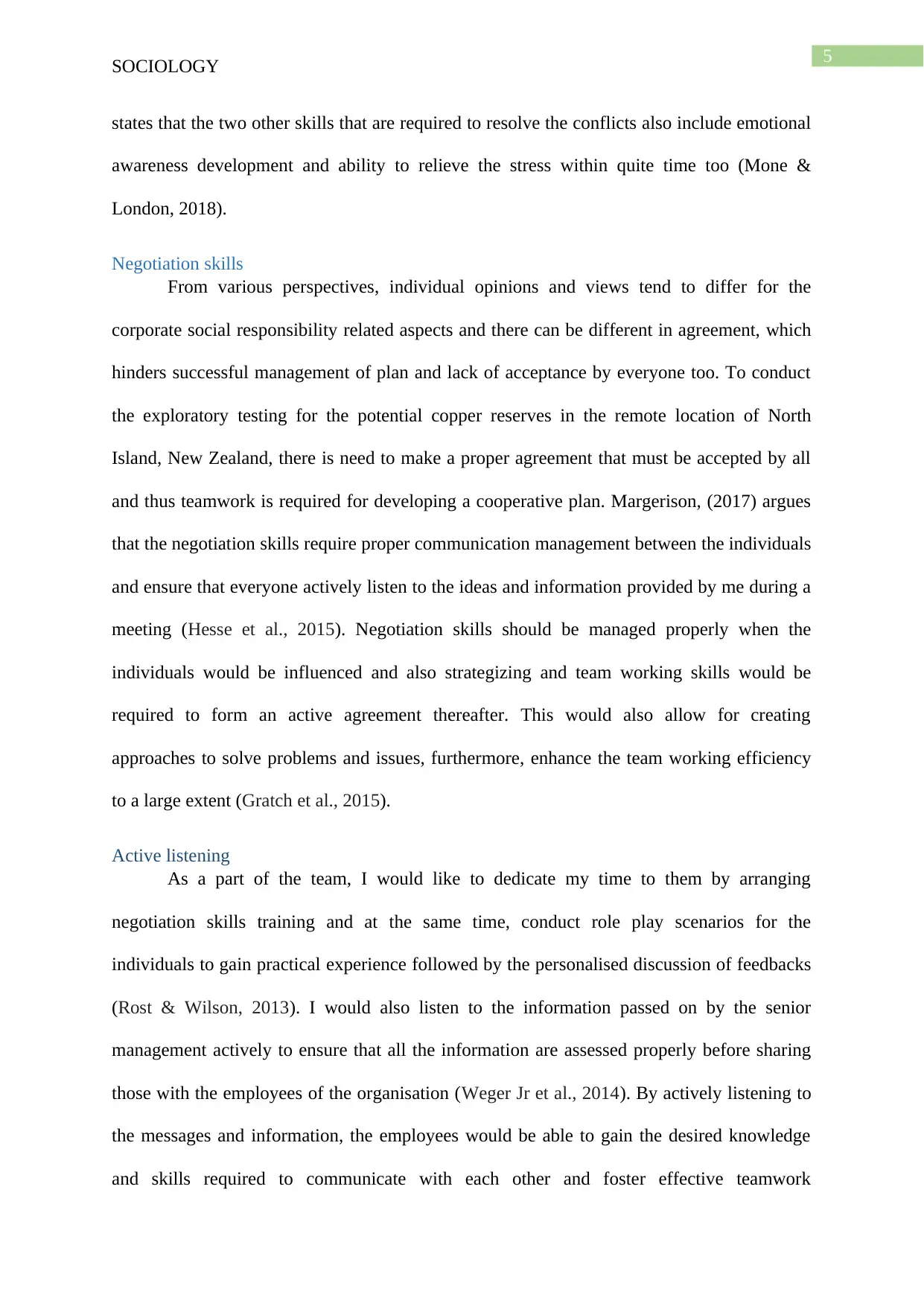
5
SOCIOLOGY
states that the two other skills that are required to resolve the conflicts also include emotional
awareness development and ability to relieve the stress within quite time too (Mone &
London, 2018).
Negotiation skills
From various perspectives, individual opinions and views tend to differ for the
corporate social responsibility related aspects and there can be different in agreement, which
hinders successful management of plan and lack of acceptance by everyone too. To conduct
the exploratory testing for the potential copper reserves in the remote location of North
Island, New Zealand, there is need to make a proper agreement that must be accepted by all
and thus teamwork is required for developing a cooperative plan. Margerison, (2017) argues
that the negotiation skills require proper communication management between the individuals
and ensure that everyone actively listen to the ideas and information provided by me during a
meeting (Hesse et al., 2015). Negotiation skills should be managed properly when the
individuals would be influenced and also strategizing and team working skills would be
required to form an active agreement thereafter. This would also allow for creating
approaches to solve problems and issues, furthermore, enhance the team working efficiency
to a large extent (Gratch et al., 2015).
Active listening
As a part of the team, I would like to dedicate my time to them by arranging
negotiation skills training and at the same time, conduct role play scenarios for the
individuals to gain practical experience followed by the personalised discussion of feedbacks
(Rost & Wilson, 2013). I would also listen to the information passed on by the senior
management actively to ensure that all the information are assessed properly before sharing
those with the employees of the organisation (Weger Jr et al., 2014). By actively listening to
the messages and information, the employees would be able to gain the desired knowledge
and skills required to communicate with each other and foster effective teamwork
SOCIOLOGY
states that the two other skills that are required to resolve the conflicts also include emotional
awareness development and ability to relieve the stress within quite time too (Mone &
London, 2018).
Negotiation skills
From various perspectives, individual opinions and views tend to differ for the
corporate social responsibility related aspects and there can be different in agreement, which
hinders successful management of plan and lack of acceptance by everyone too. To conduct
the exploratory testing for the potential copper reserves in the remote location of North
Island, New Zealand, there is need to make a proper agreement that must be accepted by all
and thus teamwork is required for developing a cooperative plan. Margerison, (2017) argues
that the negotiation skills require proper communication management between the individuals
and ensure that everyone actively listen to the ideas and information provided by me during a
meeting (Hesse et al., 2015). Negotiation skills should be managed properly when the
individuals would be influenced and also strategizing and team working skills would be
required to form an active agreement thereafter. This would also allow for creating
approaches to solve problems and issues, furthermore, enhance the team working efficiency
to a large extent (Gratch et al., 2015).
Active listening
As a part of the team, I would like to dedicate my time to them by arranging
negotiation skills training and at the same time, conduct role play scenarios for the
individuals to gain practical experience followed by the personalised discussion of feedbacks
(Rost & Wilson, 2013). I would also listen to the information passed on by the senior
management actively to ensure that all the information are assessed properly before sharing
those with the employees of the organisation (Weger Jr et al., 2014). By actively listening to
the messages and information, the employees would be able to gain the desired knowledge
and skills required to communicate with each other and foster effective teamwork
⊘ This is a preview!⊘
Do you want full access?
Subscribe today to unlock all pages.

Trusted by 1+ million students worldwide
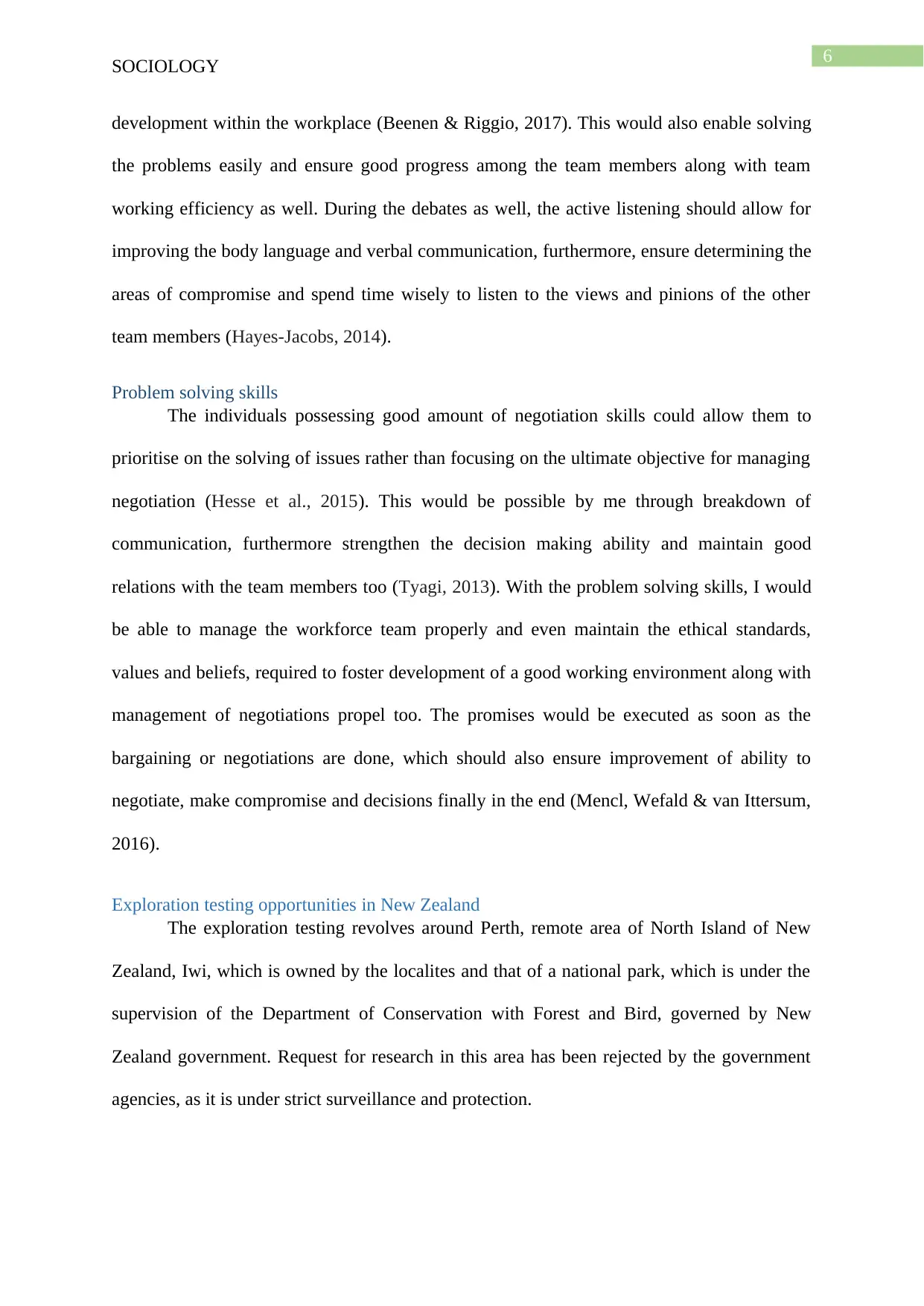
6
SOCIOLOGY
development within the workplace (Beenen & Riggio, 2017). This would also enable solving
the problems easily and ensure good progress among the team members along with team
working efficiency as well. During the debates as well, the active listening should allow for
improving the body language and verbal communication, furthermore, ensure determining the
areas of compromise and spend time wisely to listen to the views and pinions of the other
team members (Hayes-Jacobs, 2014).
Problem solving skills
The individuals possessing good amount of negotiation skills could allow them to
prioritise on the solving of issues rather than focusing on the ultimate objective for managing
negotiation (Hesse et al., 2015). This would be possible by me through breakdown of
communication, furthermore strengthen the decision making ability and maintain good
relations with the team members too (Tyagi, 2013). With the problem solving skills, I would
be able to manage the workforce team properly and even maintain the ethical standards,
values and beliefs, required to foster development of a good working environment along with
management of negotiations propel too. The promises would be executed as soon as the
bargaining or negotiations are done, which should also ensure improvement of ability to
negotiate, make compromise and decisions finally in the end (Mencl, Wefald & van Ittersum,
2016).
Exploration testing opportunities in New Zealand
The exploration testing revolves around Perth, remote area of North Island of New
Zealand, Iwi, which is owned by the localites and that of a national park, which is under the
supervision of the Department of Conservation with Forest and Bird, governed by New
Zealand government. Request for research in this area has been rejected by the government
agencies, as it is under strict surveillance and protection.
SOCIOLOGY
development within the workplace (Beenen & Riggio, 2017). This would also enable solving
the problems easily and ensure good progress among the team members along with team
working efficiency as well. During the debates as well, the active listening should allow for
improving the body language and verbal communication, furthermore, ensure determining the
areas of compromise and spend time wisely to listen to the views and pinions of the other
team members (Hayes-Jacobs, 2014).
Problem solving skills
The individuals possessing good amount of negotiation skills could allow them to
prioritise on the solving of issues rather than focusing on the ultimate objective for managing
negotiation (Hesse et al., 2015). This would be possible by me through breakdown of
communication, furthermore strengthen the decision making ability and maintain good
relations with the team members too (Tyagi, 2013). With the problem solving skills, I would
be able to manage the workforce team properly and even maintain the ethical standards,
values and beliefs, required to foster development of a good working environment along with
management of negotiations propel too. The promises would be executed as soon as the
bargaining or negotiations are done, which should also ensure improvement of ability to
negotiate, make compromise and decisions finally in the end (Mencl, Wefald & van Ittersum,
2016).
Exploration testing opportunities in New Zealand
The exploration testing revolves around Perth, remote area of North Island of New
Zealand, Iwi, which is owned by the localites and that of a national park, which is under the
supervision of the Department of Conservation with Forest and Bird, governed by New
Zealand government. Request for research in this area has been rejected by the government
agencies, as it is under strict surveillance and protection.
Paraphrase This Document
Need a fresh take? Get an instant paraphrase of this document with our AI Paraphraser
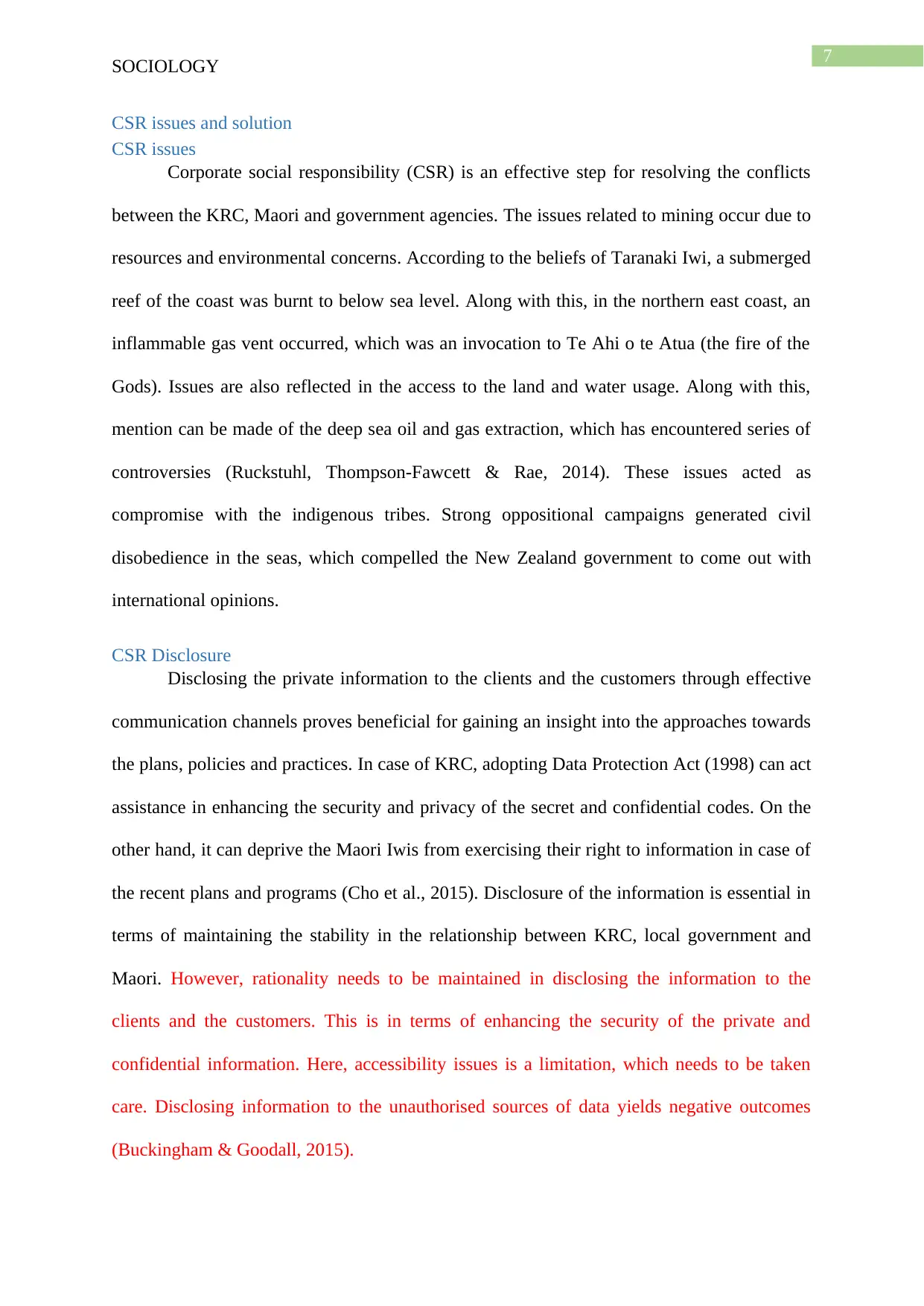
7
SOCIOLOGY
CSR issues and solution
CSR issues
Corporate social responsibility (CSR) is an effective step for resolving the conflicts
between the KRC, Maori and government agencies. The issues related to mining occur due to
resources and environmental concerns. According to the beliefs of Taranaki Iwi, a submerged
reef of the coast was burnt to below sea level. Along with this, in the northern east coast, an
inflammable gas vent occurred, which was an invocation to Te Ahi o te Atua (the fire of the
Gods). Issues are also reflected in the access to the land and water usage. Along with this,
mention can be made of the deep sea oil and gas extraction, which has encountered series of
controversies (Ruckstuhl, Thompson-Fawcett & Rae, 2014). These issues acted as
compromise with the indigenous tribes. Strong oppositional campaigns generated civil
disobedience in the seas, which compelled the New Zealand government to come out with
international opinions.
CSR Disclosure
Disclosing the private information to the clients and the customers through effective
communication channels proves beneficial for gaining an insight into the approaches towards
the plans, policies and practices. In case of KRC, adopting Data Protection Act (1998) can act
assistance in enhancing the security and privacy of the secret and confidential codes. On the
other hand, it can deprive the Maori Iwis from exercising their right to information in case of
the recent plans and programs (Cho et al., 2015). Disclosure of the information is essential in
terms of maintaining the stability in the relationship between KRC, local government and
Maori. However, rationality needs to be maintained in disclosing the information to the
clients and the customers. This is in terms of enhancing the security of the private and
confidential information. Here, accessibility issues is a limitation, which needs to be taken
care. Disclosing information to the unauthorised sources of data yields negative outcomes
(Buckingham & Goodall, 2015).
SOCIOLOGY
CSR issues and solution
CSR issues
Corporate social responsibility (CSR) is an effective step for resolving the conflicts
between the KRC, Maori and government agencies. The issues related to mining occur due to
resources and environmental concerns. According to the beliefs of Taranaki Iwi, a submerged
reef of the coast was burnt to below sea level. Along with this, in the northern east coast, an
inflammable gas vent occurred, which was an invocation to Te Ahi o te Atua (the fire of the
Gods). Issues are also reflected in the access to the land and water usage. Along with this,
mention can be made of the deep sea oil and gas extraction, which has encountered series of
controversies (Ruckstuhl, Thompson-Fawcett & Rae, 2014). These issues acted as
compromise with the indigenous tribes. Strong oppositional campaigns generated civil
disobedience in the seas, which compelled the New Zealand government to come out with
international opinions.
CSR Disclosure
Disclosing the private information to the clients and the customers through effective
communication channels proves beneficial for gaining an insight into the approaches towards
the plans, policies and practices. In case of KRC, adopting Data Protection Act (1998) can act
assistance in enhancing the security and privacy of the secret and confidential codes. On the
other hand, it can deprive the Maori Iwis from exercising their right to information in case of
the recent plans and programs (Cho et al., 2015). Disclosure of the information is essential in
terms of maintaining the stability in the relationship between KRC, local government and
Maori. However, rationality needs to be maintained in disclosing the information to the
clients and the customers. This is in terms of enhancing the security of the private and
confidential information. Here, accessibility issues is a limitation, which needs to be taken
care. Disclosing information to the unauthorised sources of data yields negative outcomes
(Buckingham & Goodall, 2015).
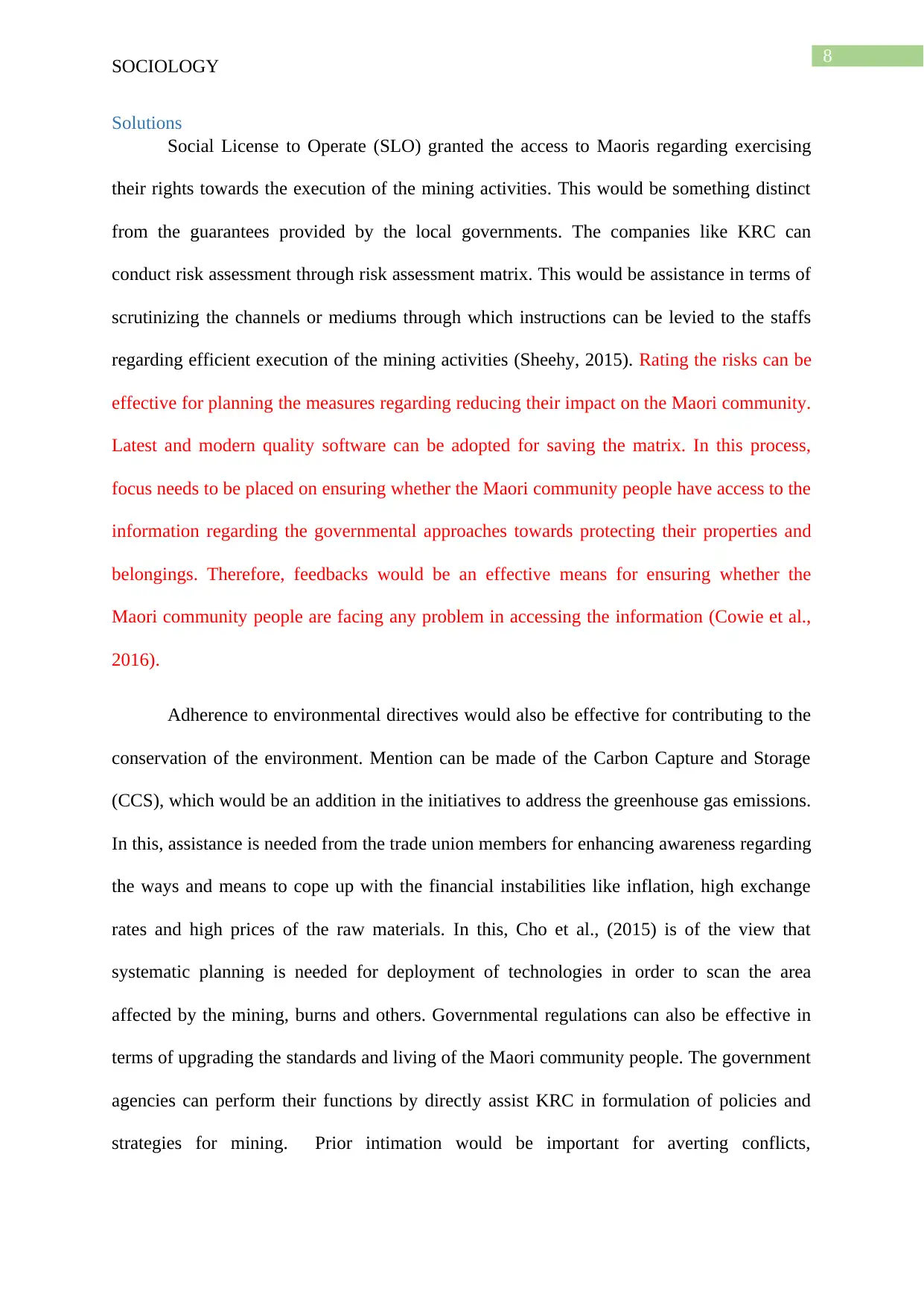
8
SOCIOLOGY
Solutions
Social License to Operate (SLO) granted the access to Maoris regarding exercising
their rights towards the execution of the mining activities. This would be something distinct
from the guarantees provided by the local governments. The companies like KRC can
conduct risk assessment through risk assessment matrix. This would be assistance in terms of
scrutinizing the channels or mediums through which instructions can be levied to the staffs
regarding efficient execution of the mining activities (Sheehy, 2015). Rating the risks can be
effective for planning the measures regarding reducing their impact on the Maori community.
Latest and modern quality software can be adopted for saving the matrix. In this process,
focus needs to be placed on ensuring whether the Maori community people have access to the
information regarding the governmental approaches towards protecting their properties and
belongings. Therefore, feedbacks would be an effective means for ensuring whether the
Maori community people are facing any problem in accessing the information (Cowie et al.,
2016).
Adherence to environmental directives would also be effective for contributing to the
conservation of the environment. Mention can be made of the Carbon Capture and Storage
(CCS), which would be an addition in the initiatives to address the greenhouse gas emissions.
In this, assistance is needed from the trade union members for enhancing awareness regarding
the ways and means to cope up with the financial instabilities like inflation, high exchange
rates and high prices of the raw materials. In this, Cho et al., (2015) is of the view that
systematic planning is needed for deployment of technologies in order to scan the area
affected by the mining, burns and others. Governmental regulations can also be effective in
terms of upgrading the standards and living of the Maori community people. The government
agencies can perform their functions by directly assist KRC in formulation of policies and
strategies for mining. Prior intimation would be important for averting conflicts,
SOCIOLOGY
Solutions
Social License to Operate (SLO) granted the access to Maoris regarding exercising
their rights towards the execution of the mining activities. This would be something distinct
from the guarantees provided by the local governments. The companies like KRC can
conduct risk assessment through risk assessment matrix. This would be assistance in terms of
scrutinizing the channels or mediums through which instructions can be levied to the staffs
regarding efficient execution of the mining activities (Sheehy, 2015). Rating the risks can be
effective for planning the measures regarding reducing their impact on the Maori community.
Latest and modern quality software can be adopted for saving the matrix. In this process,
focus needs to be placed on ensuring whether the Maori community people have access to the
information regarding the governmental approaches towards protecting their properties and
belongings. Therefore, feedbacks would be an effective means for ensuring whether the
Maori community people are facing any problem in accessing the information (Cowie et al.,
2016).
Adherence to environmental directives would also be effective for contributing to the
conservation of the environment. Mention can be made of the Carbon Capture and Storage
(CCS), which would be an addition in the initiatives to address the greenhouse gas emissions.
In this, assistance is needed from the trade union members for enhancing awareness regarding
the ways and means to cope up with the financial instabilities like inflation, high exchange
rates and high prices of the raw materials. In this, Cho et al., (2015) is of the view that
systematic planning is needed for deployment of technologies in order to scan the area
affected by the mining, burns and others. Governmental regulations can also be effective in
terms of upgrading the standards and living of the Maori community people. The government
agencies can perform their functions by directly assist KRC in formulation of policies and
strategies for mining. Prior intimation would be important for averting conflicts,
⊘ This is a preview!⊘
Do you want full access?
Subscribe today to unlock all pages.

Trusted by 1+ million students worldwide
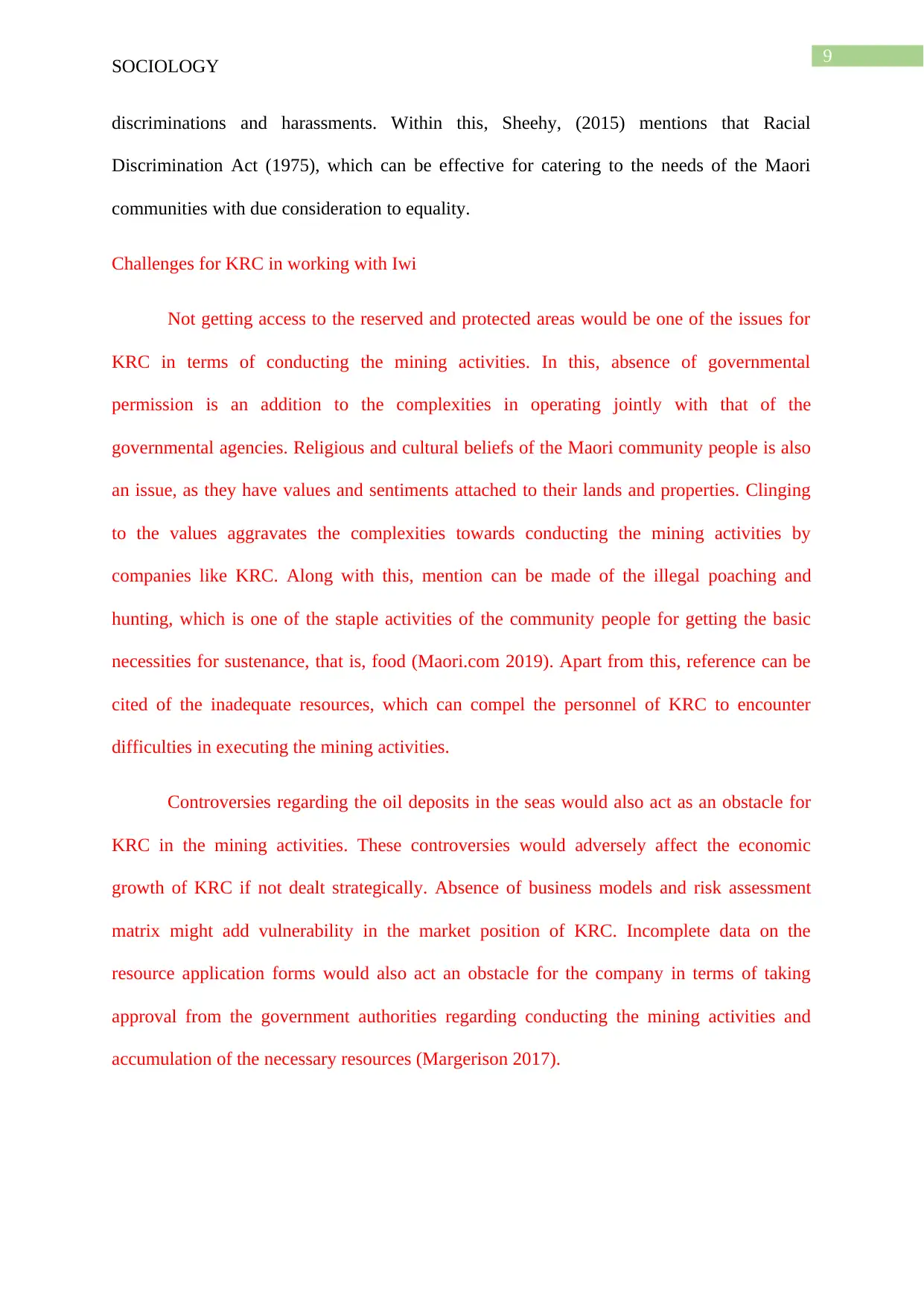
9
SOCIOLOGY
discriminations and harassments. Within this, Sheehy, (2015) mentions that Racial
Discrimination Act (1975), which can be effective for catering to the needs of the Maori
communities with due consideration to equality.
Challenges for KRC in working with Iwi
Not getting access to the reserved and protected areas would be one of the issues for
KRC in terms of conducting the mining activities. In this, absence of governmental
permission is an addition to the complexities in operating jointly with that of the
governmental agencies. Religious and cultural beliefs of the Maori community people is also
an issue, as they have values and sentiments attached to their lands and properties. Clinging
to the values aggravates the complexities towards conducting the mining activities by
companies like KRC. Along with this, mention can be made of the illegal poaching and
hunting, which is one of the staple activities of the community people for getting the basic
necessities for sustenance, that is, food (Maori.com 2019). Apart from this, reference can be
cited of the inadequate resources, which can compel the personnel of KRC to encounter
difficulties in executing the mining activities.
Controversies regarding the oil deposits in the seas would also act as an obstacle for
KRC in the mining activities. These controversies would adversely affect the economic
growth of KRC if not dealt strategically. Absence of business models and risk assessment
matrix might add vulnerability in the market position of KRC. Incomplete data on the
resource application forms would also act an obstacle for the company in terms of taking
approval from the government authorities regarding conducting the mining activities and
accumulation of the necessary resources (Margerison 2017).
SOCIOLOGY
discriminations and harassments. Within this, Sheehy, (2015) mentions that Racial
Discrimination Act (1975), which can be effective for catering to the needs of the Maori
communities with due consideration to equality.
Challenges for KRC in working with Iwi
Not getting access to the reserved and protected areas would be one of the issues for
KRC in terms of conducting the mining activities. In this, absence of governmental
permission is an addition to the complexities in operating jointly with that of the
governmental agencies. Religious and cultural beliefs of the Maori community people is also
an issue, as they have values and sentiments attached to their lands and properties. Clinging
to the values aggravates the complexities towards conducting the mining activities by
companies like KRC. Along with this, mention can be made of the illegal poaching and
hunting, which is one of the staple activities of the community people for getting the basic
necessities for sustenance, that is, food (Maori.com 2019). Apart from this, reference can be
cited of the inadequate resources, which can compel the personnel of KRC to encounter
difficulties in executing the mining activities.
Controversies regarding the oil deposits in the seas would also act as an obstacle for
KRC in the mining activities. These controversies would adversely affect the economic
growth of KRC if not dealt strategically. Absence of business models and risk assessment
matrix might add vulnerability in the market position of KRC. Incomplete data on the
resource application forms would also act an obstacle for the company in terms of taking
approval from the government authorities regarding conducting the mining activities and
accumulation of the necessary resources (Margerison 2017).
Paraphrase This Document
Need a fresh take? Get an instant paraphrase of this document with our AI Paraphraser
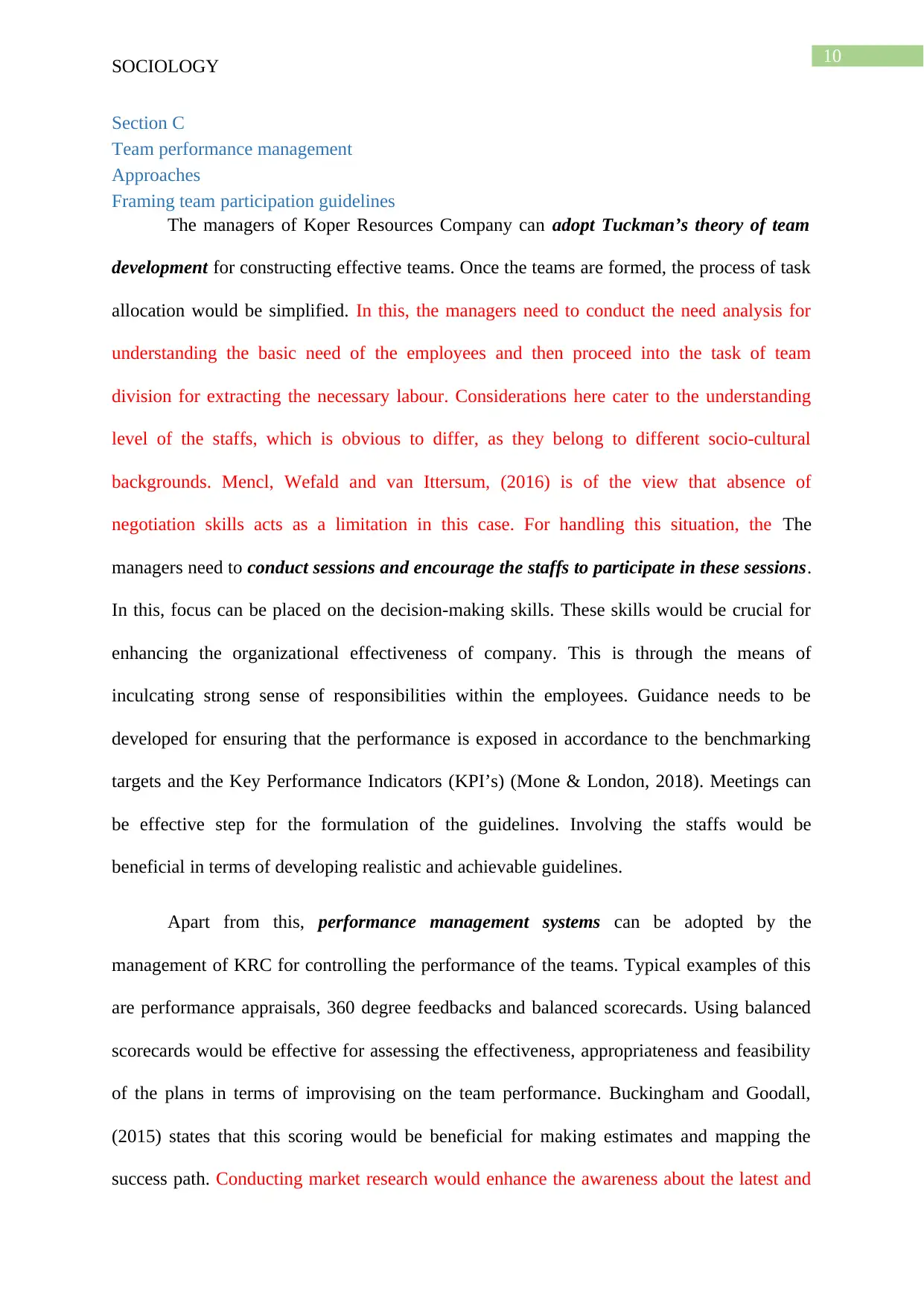
10
SOCIOLOGY
Section C
Team performance management
Approaches
Framing team participation guidelines
The managers of Koper Resources Company can adopt Tuckman’s theory of team
development for constructing effective teams. Once the teams are formed, the process of task
allocation would be simplified. In this, the managers need to conduct the need analysis for
understanding the basic need of the employees and then proceed into the task of team
division for extracting the necessary labour. Considerations here cater to the understanding
level of the staffs, which is obvious to differ, as they belong to different socio-cultural
backgrounds. Mencl, Wefald and van Ittersum, (2016) is of the view that absence of
negotiation skills acts as a limitation in this case. For handling this situation, the The
managers need to conduct sessions and encourage the staffs to participate in these sessions.
In this, focus can be placed on the decision-making skills. These skills would be crucial for
enhancing the organizational effectiveness of company. This is through the means of
inculcating strong sense of responsibilities within the employees. Guidance needs to be
developed for ensuring that the performance is exposed in accordance to the benchmarking
targets and the Key Performance Indicators (KPI’s) (Mone & London, 2018). Meetings can
be effective step for the formulation of the guidelines. Involving the staffs would be
beneficial in terms of developing realistic and achievable guidelines.
Apart from this, performance management systems can be adopted by the
management of KRC for controlling the performance of the teams. Typical examples of this
are performance appraisals, 360 degree feedbacks and balanced scorecards. Using balanced
scorecards would be effective for assessing the effectiveness, appropriateness and feasibility
of the plans in terms of improvising on the team performance. Buckingham and Goodall,
(2015) states that this scoring would be beneficial for making estimates and mapping the
success path. Conducting market research would enhance the awareness about the latest and
SOCIOLOGY
Section C
Team performance management
Approaches
Framing team participation guidelines
The managers of Koper Resources Company can adopt Tuckman’s theory of team
development for constructing effective teams. Once the teams are formed, the process of task
allocation would be simplified. In this, the managers need to conduct the need analysis for
understanding the basic need of the employees and then proceed into the task of team
division for extracting the necessary labour. Considerations here cater to the understanding
level of the staffs, which is obvious to differ, as they belong to different socio-cultural
backgrounds. Mencl, Wefald and van Ittersum, (2016) is of the view that absence of
negotiation skills acts as a limitation in this case. For handling this situation, the The
managers need to conduct sessions and encourage the staffs to participate in these sessions.
In this, focus can be placed on the decision-making skills. These skills would be crucial for
enhancing the organizational effectiveness of company. This is through the means of
inculcating strong sense of responsibilities within the employees. Guidance needs to be
developed for ensuring that the performance is exposed in accordance to the benchmarking
targets and the Key Performance Indicators (KPI’s) (Mone & London, 2018). Meetings can
be effective step for the formulation of the guidelines. Involving the staffs would be
beneficial in terms of developing realistic and achievable guidelines.
Apart from this, performance management systems can be adopted by the
management of KRC for controlling the performance of the teams. Typical examples of this
are performance appraisals, 360 degree feedbacks and balanced scorecards. Using balanced
scorecards would be effective for assessing the effectiveness, appropriateness and feasibility
of the plans in terms of improvising on the team performance. Buckingham and Goodall,
(2015) states that this scoring would be beneficial for making estimates and mapping the
success path. Conducting market research would enhance the awareness about the latest and
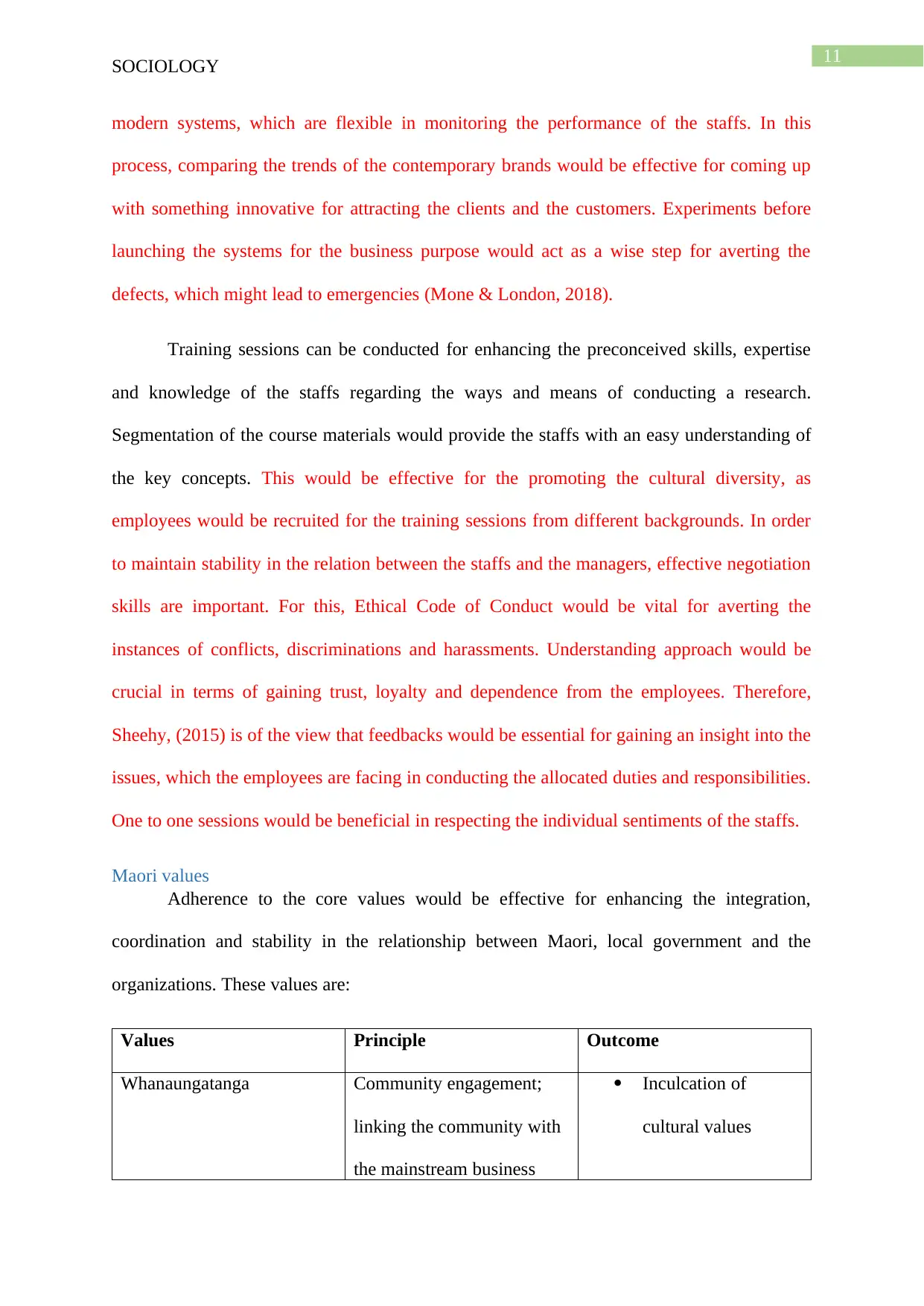
11
SOCIOLOGY
modern systems, which are flexible in monitoring the performance of the staffs. In this
process, comparing the trends of the contemporary brands would be effective for coming up
with something innovative for attracting the clients and the customers. Experiments before
launching the systems for the business purpose would act as a wise step for averting the
defects, which might lead to emergencies (Mone & London, 2018).
Training sessions can be conducted for enhancing the preconceived skills, expertise
and knowledge of the staffs regarding the ways and means of conducting a research.
Segmentation of the course materials would provide the staffs with an easy understanding of
the key concepts. This would be effective for the promoting the cultural diversity, as
employees would be recruited for the training sessions from different backgrounds. In order
to maintain stability in the relation between the staffs and the managers, effective negotiation
skills are important. For this, Ethical Code of Conduct would be vital for averting the
instances of conflicts, discriminations and harassments. Understanding approach would be
crucial in terms of gaining trust, loyalty and dependence from the employees. Therefore,
Sheehy, (2015) is of the view that feedbacks would be essential for gaining an insight into the
issues, which the employees are facing in conducting the allocated duties and responsibilities.
One to one sessions would be beneficial in respecting the individual sentiments of the staffs.
Maori values
Adherence to the core values would be effective for enhancing the integration,
coordination and stability in the relationship between Maori, local government and the
organizations. These values are:
Values Principle Outcome
Whanaungatanga Community engagement;
linking the community with
the mainstream business
Inculcation of
cultural values
SOCIOLOGY
modern systems, which are flexible in monitoring the performance of the staffs. In this
process, comparing the trends of the contemporary brands would be effective for coming up
with something innovative for attracting the clients and the customers. Experiments before
launching the systems for the business purpose would act as a wise step for averting the
defects, which might lead to emergencies (Mone & London, 2018).
Training sessions can be conducted for enhancing the preconceived skills, expertise
and knowledge of the staffs regarding the ways and means of conducting a research.
Segmentation of the course materials would provide the staffs with an easy understanding of
the key concepts. This would be effective for the promoting the cultural diversity, as
employees would be recruited for the training sessions from different backgrounds. In order
to maintain stability in the relation between the staffs and the managers, effective negotiation
skills are important. For this, Ethical Code of Conduct would be vital for averting the
instances of conflicts, discriminations and harassments. Understanding approach would be
crucial in terms of gaining trust, loyalty and dependence from the employees. Therefore,
Sheehy, (2015) is of the view that feedbacks would be essential for gaining an insight into the
issues, which the employees are facing in conducting the allocated duties and responsibilities.
One to one sessions would be beneficial in respecting the individual sentiments of the staffs.
Maori values
Adherence to the core values would be effective for enhancing the integration,
coordination and stability in the relationship between Maori, local government and the
organizations. These values are:
Values Principle Outcome
Whanaungatanga Community engagement;
linking the community with
the mainstream business
Inculcation of
cultural values
⊘ This is a preview!⊘
Do you want full access?
Subscribe today to unlock all pages.

Trusted by 1+ million students worldwide
1 out of 18
Related Documents
Your All-in-One AI-Powered Toolkit for Academic Success.
+13062052269
info@desklib.com
Available 24*7 on WhatsApp / Email
![[object Object]](/_next/static/media/star-bottom.7253800d.svg)
Unlock your academic potential
Copyright © 2020–2026 A2Z Services. All Rights Reserved. Developed and managed by ZUCOL.





